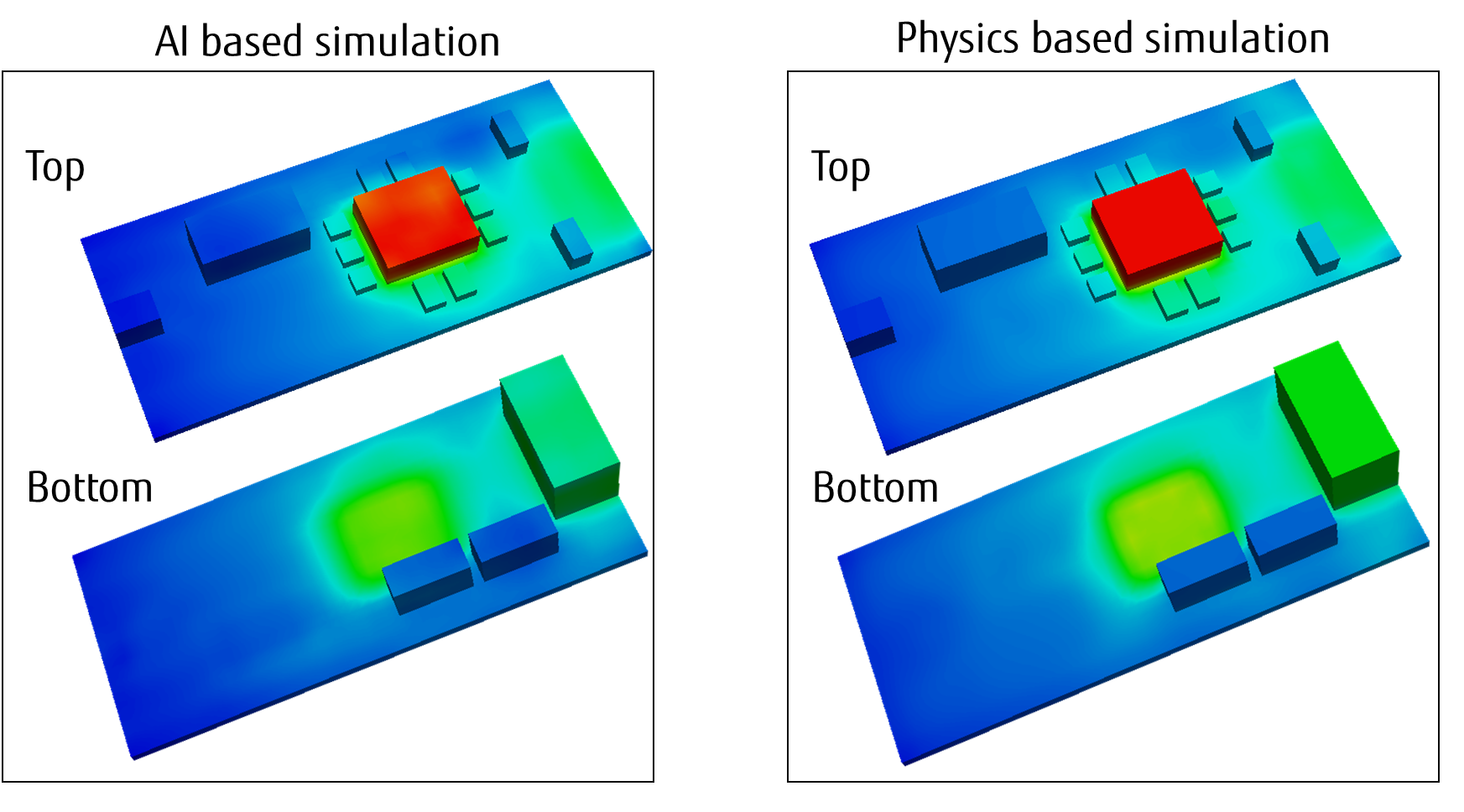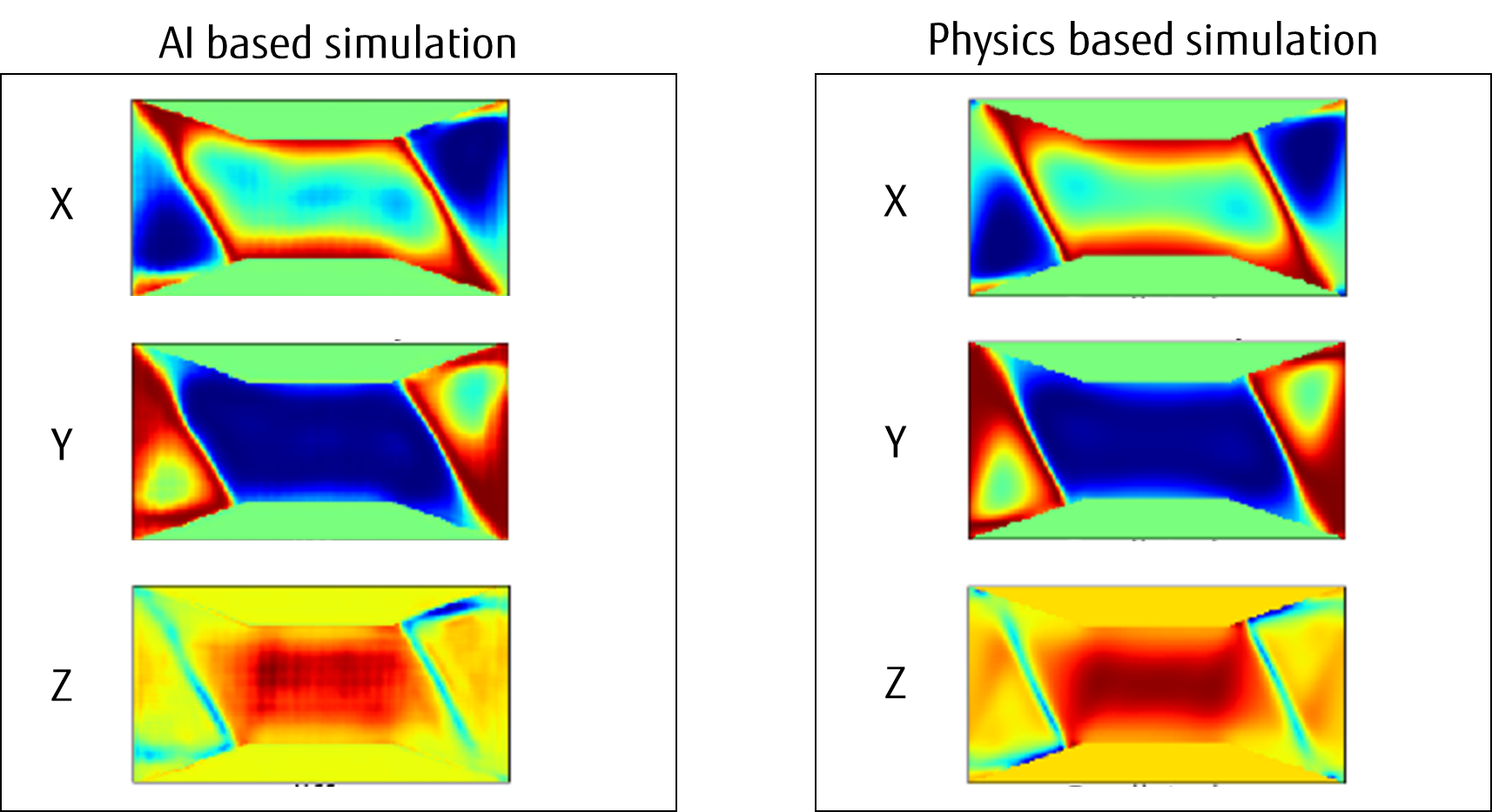Archived content
NOTE: this is an archived page and the content is likely to be out of date.
Fujitsu Laboratories’ New AI Solver Platform Enables Next Generation of Real-Time AI Simulators
- Fujitsu Laboratories’ new AI technology and platform converts physical-based simulators into fast, highly accurate AI simulators without compromising functionality
- Delivering high performance ‘approximate’ calculations for highly complex scenarios, the technology speeds up processes by a factor of x3000 compared to conventional solutions
- It has the potential to revolutionize applications such as Computer Aided Engineering (CAE), product design and autonomous smart device performance
The potential applications for Fujitsu’s AI Solver are extensive. For product design applications, it can enable designers to receive real-time feedback rather than waiting hours for results. For smart devices, involving robots that need to adapt to their environment autonomously, real-time simulation results would dramatically increase both efficiency and automony compared to the use of simple heuristics.
Dr Adel Rouz, CEO of Fujitsu Laboratories of Europe explains: “While the advent of HPC and cloud computing has transformed the simulation process by reducing the associated hardware and software costs, we have not yet seen this translated into a significant reduction in the time taken to perform individual simulations. The conversion of traditional physics-based simulators into AI simulators is an important breakthrough, bringing the time taken for a single simulation down from hours to milliseconds, thus delivering real-time results. A key challenge for us was being able to incorporate all the features of the original solver rather than only allowing users to modify the geometry. Additionally, this had to be achieved in a consistent and generic way, rather than on a case-by-case basis. While in the short term our technology targets traditional users of CAE such as designers, the potential applications go well beyond product design and include increasing the efficiency of smart devices, such as robots, when guided by real-time simulations rather than heuristics.”
Mr Akihiko Miyazawa, CEO of FATEC elaborates from the design perspective: “Design for electronics devices is a complex, demanding task that necessitates balancing numerous competing objectives with component arrangement, stringent temperature constraints, size restrictions, weight limitations and widely varying operating conditions. In addition, designers are forced to evaluate multiple design scenarios in tighter schedules, making physical prototyping for the evaluation of design alternatives both time-consuming and costly. To address these challenges, designers can now use AI simulators, allowing them to test a design virtually in order to gauge performance for numerous scenarios in a very short timespan. As a result of Fujitsu’s breakthrough technology, the whole process is dramatically optimized.”
Examples of Fujitsu’s AI Solver platform include the conversion of two very different types of physical simulators into AI simulators. The first involves a 3D heat transfer simulator that models the thermal interaction between solids and fluids, often used to design and verify the cooling of electronics. It consists of a multi-physics simulation that requires the handling of multiple material properties, power sources and radiation.
The second example is a computational electromagnetic simulator that models the magnetization of a solid that is subjected to the influence of an external magnetic field, often used for the design of hard drive heads or other memory devices. As shown in the examples below, the results of the reference physics-based simulators and their AI counterparts are almost indistinguisble, i.e., the discrepancy is less than 2%.

 Fujitsu Laboratories of Europe is a Center of Excellence for Fujitsu’s advanced research into machine learning and deep learning, as part of the digital solutions and services being developed under the Fujitsu’s Human Centric AI approach Zinrai. Fujitsu Laboratories of Europe’s activities include extensive collaboration and co-creation with Fujitsu customers and research organizations across Europe, including San Carlos Clinical Hospital in Madrid (with the HIKARI AI intelligent healthcare solution), and the University of Seville (data analytics for tourism applications).
Fujitsu Laboratories of Europe is a Center of Excellence for Fujitsu’s advanced research into machine learning and deep learning, as part of the digital solutions and services being developed under the Fujitsu’s Human Centric AI approach Zinrai. Fujitsu Laboratories of Europe’s activities include extensive collaboration and co-creation with Fujitsu customers and research organizations across Europe, including San Carlos Clinical Hospital in Madrid (with the HIKARI AI intelligent healthcare solution), and the University of Seville (data analytics for tourism applications).Prior attempts to create AI simulators targeted only one specific application, powered by a bespoke deep network architecture, with the only user-feature being the ability to modify the shape of the object being simulated, with all other simulation conditions remaining constant. In order to broaden the applicability of AI simulators, Fujitsu has developed a new deep network architecture capable of handling not only geometry but also a wide range of physical properties such as material properties, radiation or external magnetic fields. This is achieved by automatically mapping each physical property to a property field that is linked to the geometry, with all the created fields then provided to the network as separate input channels. This is done in such as way as to allow the network accurately to learn the contribution of each property to the final output. While hyperparameter tuning is sometimes required, the same network architecture can be used for many types of AI simulators, approximating very different physical phenomena. The use of a single network architecture allows the use of a common pipeline with standardized input and output operations.
With the execution of a physics-based simulation taking from hours to days, generating databases with tens of thousands of data items can be a very time-consuming process. Once the data has been generated, the training of the deep network itself is equally time-intensive, especially when the network needs to be trained multiple times to optimize its hyper-parameters. In order to shorten the total learning time, the Fujitsu AI Solver platform overlaps parallel data generation with the tuning of the hyper-parameters. The tuning process starts as soon as a small amount of data has been generated (e.g. 10-20%) and continues as the data generation progresses. The end result is that it is possible to obtain a fully trained network almost immediately after the data generation has been completed.
This new AI solution is part of Fujitsu’s digital solutions and services being developed under the Human Centric AI approach called Zinrai, which comprises a comprehensive framework of component technology, such as machine learning, deep learning and visual recognition.
- PR from AI Lab for SB: http://pr.fujitsu.com/jp/news/2018/09/19-4.html
Online resources
- Read the Fujitsu blog: https://blog.uk.fujitsu.com/
- Follow Fujitsu on Twitter: https://twitter.com/fujitsu_uk
- Follow us on LinkedIn: https://www.linkedin.com/company/fujitsu-uk-and-ireland/
- Find Fujitsu on Facebook: https://en-gb.facebook.com/fujitsuuk/
- Fujitsu pictures and media server: http://mediaportal.ts.fujitsu.com/pages/portal.php
- For regular news updates, bookmark the Fujitsu newsroom: https://www.fujitsu.com/uk/news/pr/
About Fujitsu
Fujitsu is the leading Japanese information and communication technology (ICT) company, offering a full range of technology products, solutions, and services. Approximately 140,000 Fujitsu people support customers in more than 100 countries. We use our experience and the power of ICT to shape the future of society with our customers. Fujitsu Limited (TSE: 6702) reported consolidated revenues of 4.1 trillion yen (US $39 billion) for the fiscal year ended March 31, 2018. For more information, please see http://www.fujitsu.com.
About Fujitsu UK and Ireland
Fujitsu UK & Ireland employs over 9,000 people. We promote a Human Centric Intelligent Society, in which innovation is driven by the integration of people, information and infrastructure. We are committed to Digital Co-creation, blending business expertise with digital technology and creating new value with ecosystem partners and customers. We enable our customers to digitally transform with connected technology services, focused on Artificial Intelligence, the Internet of Things, and Cloud - all underpinned by Security. Our customers cover both the public and private sectors, including retail, financial services, transport, manufacturing, government and defence. For more information please see http://uk.fujitsu.com
About Fujitsu Laboratories of Europe
Established in 2001 and with an active presence in Europe since 1990, Fujitsu Laboratories of Europe Limited represents Fujitsu Laboratories across EMEIA, focusing on regional initiatives that reflect the diverse mix of countries and ideologies. Fujitsu Laboratories of Europe is focused on the creation of cutting-edge solutions that benefit society, adopting a co-creation strategy and working with customers, collaboration partners and society as a whole to pioneer a new generation of user-centric applications and services underpinned by creative information analytics. As one of Fujitsu’s global centers of excellence for AI, its work encompasses security, social innovation, manufacturing, AI ethics, and high performance computing applications. For more information, please see http://www.fujitsu.com/uk/fle/.
About Fujitsu Advanced Technologies
As Fujitsu’s company that supports product design and manufacturing for customers, Fujitsu Advanced Technologies provides the technical expertise developed by Fujitsu via the Engineering Cloud™ platform. This development platform uses the latest ICT to deliver high speed, high reliability and high performance for customer applications. A key focus for Fujitsu Advanced Technologies includes total customer support to achieve higher efficiency, low cost and shortest possible product development cycles, applying its extensive technology and expertise across analysis, testing, assembly, cooling and circuit design acquired from the development of a diverse cross-section of products, ranging from super computers to smart phones. Fujitsu Advanced Technologies aims to be the partner of choice, working with customers to develop a comfortable and safe society.
All other company or product names mentioned herein are trademarks or registered trademarks of their respective owners. Information provided in this press release is accurate at time of publication and is subject to change without advance notice.
Georgina Garrett
Director
![]() Phone: +44 1903 854900
Phone: +44 1903 854900
![]() E-mail: fujitsu@garrett-axford.co.uk
E-mail: fujitsu@garrett-axford.co.uk
Company:Garrett Axford Ltd (on behalf of Fujitsu Laboratories of Europe Ltd)
Graham Goulden
![]() Phone: + 44 (0)20 3949 2205
Phone: + 44 (0)20 3949 2205
![]() E-mail: graham.goulden@uk.fujitsu.com
E-mail: graham.goulden@uk.fujitsu.com
Company:Fujitsu
Daisy Onida
![]() Phone: +44 (0) 20 7861 2800
Phone: +44 (0) 20 7861 2800
![]() E-mail: teamfujitsu@harvard.co.uk
E-mail: teamfujitsu@harvard.co.uk
Company:Harvard
All other company or product names mentioned herein are trademarks or registered trademarks of their respective owners. Information provided in this press release is accurate at time of publication and is subject to change without advance notice.
Date: 07 November, 2018
City: London



 01235 797711
01235 797711
